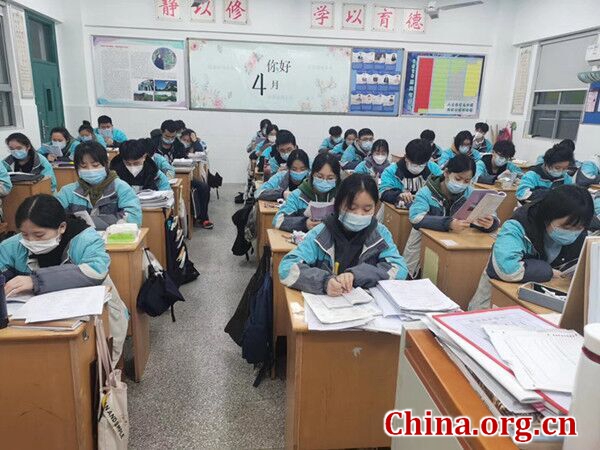Coordinating epidemic prevention and education: schools in China reopened with caution
- By Wang Yiming
 0 Comment(s)
0 Comment(s) Print
Print E-mail China.org.cn, April 9, 2020
E-mail China.org.cn, April 9, 2020
Wang Qinnan, a teacher of Qianhuang International Middle School in east China's Jiangsu Province, told China.org.cn that after her school resumed classes on March 30 following the COVID-19 lockdown, strict anti-epidemic measures were adopted.

"According to the epidemic prevention arrangements, we are staggering the rate at which students enter the school and cafeteria to make sure they keep distance. Teachers and students must have their temperature checked when entering and leaving the campus. Anyone whose temperature exceeds 37.3°C after being measured twice will be sent to an isolation area and reported immediately to principal."
Wang continued to describe how it works, "we measure students' body temperature three times a day. The security guards disinfect the classroom everyday after students finish the night self-learning at 10:30 pm."
As China has suppressed transmission of the virus to a very low level, students from primary school all the way up to college in more than 20 provinces and cities have gradually returned to their campuses or are scheduled to do so.
In Jiangsu province, high school seniors resumed classes on March 30 so that to better prepare for the college entrance exams later this year. Students in other grades were due to return to school after April 7, while colleges will reopen after April 13 with staggered starting times.
Though it has slashed the overall infection rate, China still maintains vigilance as it grapples with imported and asymptomatic cases.
According to the notice on education and teaching work for the spring semester after the opening of primary and secondary schools, published by China's Ministry of Education on March 31, schools are required to give top priority put epidemic prevention and control, thoroughly coordinating epidemic prevention and education and teaching work.
Since Qianhuang International Middle School reopened classes, aside from her teaching work, English teacher Wang Qinnan has additional tasks regarding epidemic prevention.
"We teachers take turns to join the security guard to help measure students' body temperature. I was on duty this Monday and I waited at the school gate at 6:05 am to check the temperature, and then made rounds at the cafeteria from 6:45-7:15 to make sure the students keep their distance and reduce verbal interaction. After finished the lessons in the morning, I went to the cafeteria again," Wang said.
In order to ensure that students are seated in a safe distance while eating, Wang Qinnan's school separated the tables with space for eight people and now allows only three students. The school staff cafeteria was also remodeled. The morning exercise or running routines outdoors are temporarily canceled.
"Wearing masks throughout the whole class is very uncomfortable. SometimesI feel breathlesswhile speaking and I get sore ears," Wang said. "I think the students are much more uncomfortable because they have to wear it all day long."
Although the workload seems to have increased after the school reopened, Wang Qinnan still believes that, under the premise of taking preventive measures, it is beneficial for students to come back to campus compared with taking online classes.
"For students who are not self-disciplined, after their parents return to work, it's hard for them to stay focused facing the computer all day without the supervision of parents. The seniors are about to take the make-or-break college entrance examination in just a couple of months," Wang stressed.
Chai Yilei, a high school senior said that the school is a place where people gather so there is indeed risk of cross-infection. "However, I am in my final year of high school and facing the gaokao (university entrance exam). I think it's better for me to return to school, as long as we take necessary precautions."
Over a thousand kilometers away, senior high school students from Shuangliu Middle School in Sichuan province, also started school earlier this month. On the first day back to school, teachers of all grades volunteered to help students carry luggage as parents are not allowed to enter the campus.
"We teachers are expected to provide psychological counseling for the seniors who were confined at home for a long time and I found most of them felt relieved to be back on campus, even after they heard the news that the gaokao had been postponed," Li Ying, a teacher of Shuangliu Middle School said. "They think they could study for an extra month to make up for the time lost due to the epidemic."
Liang Ziqi, a student from Nanjing Normal University Zhongbei College in Jiangsu province, has been taken online classes at home since March 1. At the beginning of this month, she received the notice to return to college on April 13.
According to the college notice, students will officially resume classes from April 16. But before returning to school, they need to fill out information forms including health status and travel history. Students who do not meet certain conditions are not allowed to return to school.
In addition, after the college reopened, students should check their temperature in the dormitory twice a day and report health information via an app "Campus Today."
"We may continue to take online courses in the first two weeks of quarantine, for the online-offline course transition as well. According to the school notice, we will have classes on Saturday later," Liang Ziqi said.
"Anyway, it's good to finally get back on campus. The online learning is less efficient for me and I started to worry about the exams if it continues."





